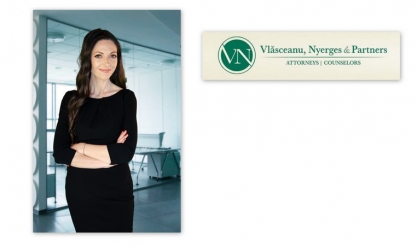
Developing Renewables in Romania: PUZ or Pass?
17 Octombrie 2022 Mihaela Nyerges, Partener - Vlăsceanu, Nyerges & Partners
The practice of the authorities seems to differ: there are local authorities that request a PUZ for the issuance of the building permit, and authorities that no longer impose such an obligation through the urban planning certificate.

|
One of the most frequent questions asked there days by renewables investors and developers is whether PUZ is still required for developing small renewable power projects in Romania (below 50 ha). The relevance of this question is huge as the answer impacts on the duration of the development process with up to 9 months.
To answer, brief preliminary comments should be made regarding the general construction permitting rules, depending on the various types of lands.
1. Types of lands
The following lands qualifications are relevant for the current topic:
(i) from the perspective of their location, the lands can be (a) located intra-muros (within the buildable perimeter of the respective territorial administrative unit) or (b) located extra-muros (outside such perimeter);
(ii) from the perspective of their destination, the lands can be, among others, (a) agricultural lands or (b) yards-constructions lands;
(iii) from the perspective of their fertility class, the agricultural lands are split into 5 fertility classes, ranging from very fertile land (Class I) to very low fertile land (Class V); the fertility class is established based soil analysis made by experts within the county Office of Pedological Studies.
2. General construction rule
As a general rule, all constructions may be erected only on lands (i) located intra-muros and (ii) qualifying as “yards-constructions”.
If the targeted land qualifies as extra-muros and agricultural land (which is typically the case with the land suitable for renewable projects),
(i) the land should be first requalified from extra-muros into intra-muros land by means of a PUZ;
(ii) no additional formalities should be done for converting the land from agricultural land to “yards-construction” land, as such conversion occurs automatically through the issuance of the building permit.
3. Exception dedicated to renewable energy projects
Late July this year, an exception from the above rule was adopted, expressly allowing the construction of renewable power generation projects on extra-murros lands if the following conditions are met:
(i) land has fertility class III, IV and V; and
(ii) land does not exceed 50 ha.
Therefore, projects falling within the above limitations no longer need to obtain requalification of the land from extra-muros to intra-murros land through a PUZ.
4. Need of a PUZ in case of renewable projects below 50 ha
Therefore, do we still need or not a PUZ for developing renewable on land with fertility class III, IV and V which does not exceeds 50 ha?
The practice of the authorities seems to differ: there are local authorities that request a PUZ for the issuance of the building permit, and authorities that no longer impose such an obligation through the urban planning certificate. We have also encountered a case where the authority changed its mind after having issued an urban planning certificate whereby no PUZ was requested.
Nevertheless, it should be mentioned that PUZ has multiple roles, not just the introduction of land into intra-murros area, as explained below:
(i) according to the general construction law (with certain exceptions not applicable hereto), the building permit may be issued only if (a) there is an urban documentation approved regarding the respective land, setting out the legal, technical and economical regime of the land and (b) the envisaged construction is compatible with the rules set out by the respective urban documentation;
(ii) all communes and towns in Romania must have an urban documentation approved – namely a general urban plan (“PUG”) adopted by the local authorities setting out (a) the function of each land (such as residential, industrial etc.) and (b) the applicable urbanism parameters and limitations (such as land occupation percentage, land occupation coefficient, height regime, etc.);
(iii) PUG is a sufficient urbanism documentation for the issuance of a building permit if (a) it provides the legal, technical and economical regime of the targeted land and (b) the envisaged project is compatible with the regime set out thereby;
(iv) if (a) the PUG does not provide the legal, technical and economical regime of the targeted land or (b) the envisaged construction is not compatible with the rules set out by the PUG for the targeted land or (c) there is no PUG in place (for example, it was never approved, it expired, it was cancelled in court or suspended), the developer must obtain a zonal urban plan (“PUZ”) whereby to adopt/amend the urbanism rules so that they are compatible with the project;
(v) generally, PUGs do not regulate extra-muros land or do not establish an urbanism function/regime compatible with renewable projects;
(vi) very recently, a new exception from the need to adopt an urbanism documentation was added in case of other specific types of constructions allowed on extra murros land.
Further to the above, PUZs are still needed for developing renewable projects on lands below 50 ha in order to establish the function and urbanism parameters of the respective land that are compatible with the envisaged project. Nevertheless, a case-by-case assessment should be made regarding the PUG rules applicable on the respective land. Such assessment should be made by the consultants of the developer, without simply relying on the assessment made by the local authorities when issuing the urbanism certificate.
| Publicitate pe BizLawyer? |
  |
| Articol 826 / 4464 | Următorul articol |
| Publicitate pe BizLawyer? |
 |

LegiTeam: Lawyer - Corporate M&A | Reff & Associates
Women Lawyers | Cultura organizațională din cadrul BSMP promovează leadershipul feminin și echitatea de gen. Andreea Roman, Managing Associate: ”Doamnele au dat dovadă de tenacitate, venind cu soluții inovative, deseori cu o altă perspectivă și, desigur, cu atenție sporită la detalii, ceea ce atrage aprecierile clienților în mandatele gestionate”
EY-Parthenon a asistat acționarii Forza Rossa și British Motors în vânzarea dealerilor auto Ferrari și Aston Martin în România
LegiTeam: Zamfirescu Racoţi Vasile & Partners recrutează avocat definitiv dreptul muncii | Consultanță
CMS asistă SYNLAB cu privire la vânzarea unor părți semnificative din operațiunile sale de diagnostic de laborator din Europa de Est. Echipa care a acordat asistență pe aspectele de drept românesc, coordonată de Rodica Manea (Partener)
Women Lawyers | De vorbă cu Ioana Șampek, avocat ce a împlinit 20 de ani de când face parte din colectivitatea PNSA, în care a evoluat până la rolul de Partener și a construit împreună cu colegii o echipă omogenă, bazată pe respect și sinceritate: “Suntem de ani buni una dintre cele mai puternice echipe de specialiști de pe piața locală de avocatură. Prețuim inteligența, forța loialității, onestitatea, tenacitatea și dorim ca întotdeauna să fim ‘more than just expertise’ ”
Women Lawyers | Doamnele sunt bine reprezentate în structura Popescu & Asociații, unde coordonează cu succes mandate provocatoare și complexe, contribuind la poziționarea firmei în rândul liderilor din piața avocaturii. Loredana Popescu, Partener și unul dintre fondatorii firmei: ”Femeile au, de obicei, capacitatea de a asculta cu adevărat, de a înțelege nu doar litera legii, dar și implicațiile umane ale unei spețe. În negocieri, avem răbdare, tact și o abilitate de a crea strategii pe termen lung. Totodată, în litigii, suntem perseverente și strategice”
Eveniment Schoenherr pentru companii active în domeniul alimentar - reglementări, tendințe și practică: 8 mai 2025, București
O singură casă de avocatură locală independentă concurează la titlul de ”Firma anului în România” în cadrul IFLR Europe Awards 2025, ceremonie ce va avea loc joi | NNDKP, Schoenherr și Clifford Chance Badea, printre firmele aflate pe lista scurtă a premianților din acest an
Filip & Company a asistat grupul Digi la contractarea unui împrumut de peste 54,7 mil. € în România și a unui împrumut de 275 mil. € în Spania | Alexandru Bîrsan (co-managing partener) și Rebecca Marina (counsel), în prim plan
VIDEO | Pastila de insolvență – Procedurile de restructurare (powered by ZRVP)
Rundă de promovări la ZRVP | Echipa de seniori a firmei crește cu șapte avocați. Dr. Cosmin Vasile: ”Ceea ce definește avocatul ZRVP este căutarea obsesivă a soluției juridice care să răspundă cel mai bine nevoilor clientului, iar aceasta este calitatea cheie a fiecărui membru al echipei ZRVP și primul criteriu care stă la baza promovărilor anuale”
-
BizBanker
-
BizLeader
- in curand...
-
SeeNews
in curand...











 RSS
RSS














































